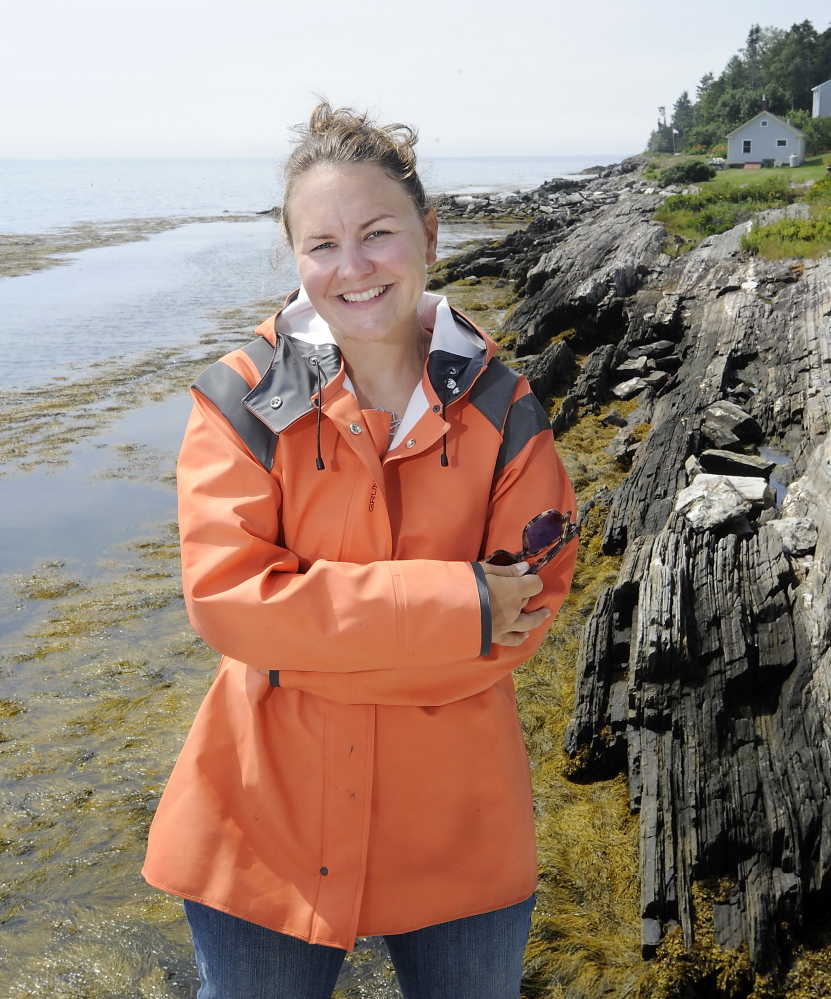Monique Coombs is the new Seafood Program director for the Brunswick-based Maine Coast Fishermen’s Association – a gig that in some sense she’s been working toward ever since she fell in love with a lobsterman on Orr’s Island. We called her up to discuss such important matters as whether the trendy new name for shedders, aka sheddahs, is a smart marketing move; the beauty of ugly fish; and why it is so essential to include seafood in conversations about local foods.
BACKGROUND: Coombs spent her early childhood globe-trotting with her military family. She was born in Belgium, lived in Munich and Heidelberg, Germany, and then, when her father left the military, the family moved to Yarmouth so she could go to high school (North Yarmouth Academy). It was there that she met her future husband, Herman, who came from Orr’s Island. They married, had babies, and when the price of lobster bottomed out in 2008, Coombs felt the urge to get involved. Her first piece of seafood promotion was a self-published cookbook, “Lobster on the Fly.”
“I just wanted to participate,” she said. “I am not good at standing idly by, which I think is a common trait among fishermen’s wives.” Favorite lobster dishes? Lobster quesadillas or nachos are high on the list. “I’m a big fan of high-end snack foods, and lobster is the perfect ingredient for something like that. Lobster Poutine! Mon dieu!”
THE BUG FOR BUGS: She caught the bug for promoting sea bugs. And other kinds of bounty from Maine waters. She started writing articles for fishing newsletters, then attending meetings of the Eat Local Foods Coalition. The conversations around agriculture were lively and exciting, but she felt something was missing. “I would sit there and say “That’s awesome, but what about seafood?’ ” She went on to do consulting for the Penobscot East Resource Center and to work with researchers at the Massachusetts Institute of Technology studying fisheries. She also worked for a year at Hancock Gourmet Lobster Company in Topsham. Her job at the Maine Coast Fishermen’s Association started eight months ago.
APPLES AND ORANGES? She’s still saying, “What about seafood?” Farming and fishing are by no means the same. “They have similar struggles around finances and weather, but they have so many huge differences as well.” Like the huge and highly perishable volume fishermen deal with. And the way the two things are marketed.
HOW SO? “There is this huge disconnect,” Coombs said. “There is a real misunderstanding about how the seafood chain works. Rightly so, though. Man, is it complicated.” Even for her: “I’m married to a fishermen and even I have my moments where I am like, ‘Wait, what permit do they have to have for that?’ If I have those questions, I can’t imagine what the consumers think.” She quotes author, Freeport resident and sustainable fishing advocate Barton Seaver, whom she heard speak on the topic. “He said, ‘Consumers think food comes from farmers and fish comes from the ocean.’ ”
OCEANS AND FIELDS: Sometimes, Coombs said, fishermen get a bum rap. “Oftentimes they get lumped into what is happening with the ocean and people don’t necessarily distinguish between the fishermen and where they work.” Sometimes it’s framed that fishermen are harming the resource, she said. “They work out there. They love it. They don’t want to ruin the ocean as much as a farmer doesn’t want to ruin their field.” (Although that does happen. Er. Dust Bowl?) In her work, she wants to counter that perception.
ROCKY COAST ROCK STARS: At farmers markets, there’s a lot more transparency. “You can go to a farmer and buy a carrot from them at farmers markets and say, ‘Oh, this came from your field this morning?’ ” But more often than not, she said, when consumers bring home fish and are asked where it came from, the answer is something generic. Like, “Harbor Fish.” She’d like to see more restaurants in say, Brunswick, serve fish caught off Harpswell and identify it as such, linking it to the boat that caught it. “There is a bounty of fishing in Maine and we’d like to tell that story,” she said. “Hopefully, some day the fishermen in Maine are the rock stars, like the farmers.”
DOGFISH: Lobster might be her first love, but she’s eager to promote all seafoods, including dogfish, which she says is unfairly maligned because it’s so ugly. But it’s also delicious. “That’s what they use for fish and chips in the UK!” she said.
SOFT OR NEW? While we’re talking seafood, where does Coombs stand on the issue of “new shells,” the new term restaurants are using to describe soft-shell lobsters, aka shedders? “I don’t think anyone around here is going to start saying ‘new shell’ – shedders will always be local nomenclature. But when the Maine Lobster Marketing Collaborative is speaking with higher-end restaurants and big-time buyers or folks from overseas, new shell is framed better, is a bit more descriptive and better marketing. As much as it may be painful for us to hear, there are better ways to say things and talk about things.”
Send questions/comments to the editors.




Success. Please wait for the page to reload. If the page does not reload within 5 seconds, please refresh the page.
Enter your email and password to access comments.
Hi, to comment on stories you must . This profile is in addition to your subscription and website login.
Already have a commenting profile? .
Invalid username/password.
Please check your email to confirm and complete your registration.
Only subscribers are eligible to post comments. Please subscribe or login first for digital access. Here’s why.
Use the form below to reset your password. When you've submitted your account email, we will send an email with a reset code.